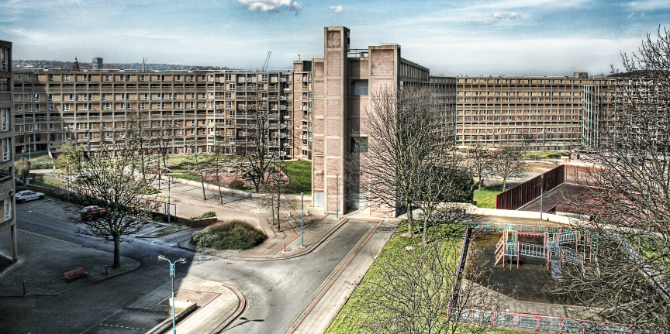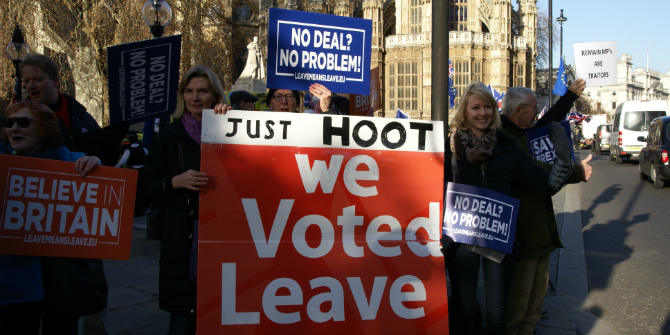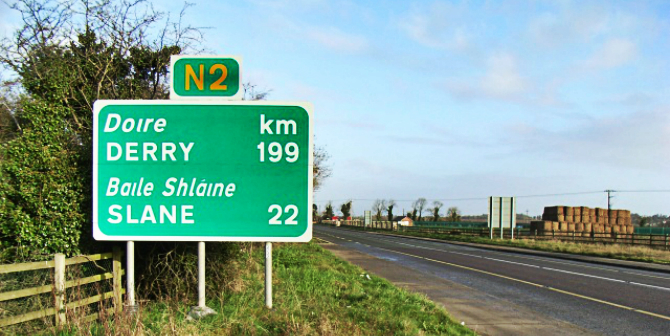 When British citizens voted to leave the EU, the country changed forever. Overnight, Britain’s economic, legal and political life, governed by a supranational framework, was thrown up in the air. Much of the commentary has hurried to look into the future, asking what the referendum results will mean. Insa Koch argues that unless the focus can be redirected to the present and past, there is a danger that the Brexit vote will be misunderstood.
When British citizens voted to leave the EU, the country changed forever. Overnight, Britain’s economic, legal and political life, governed by a supranational framework, was thrown up in the air. Much of the commentary has hurried to look into the future, asking what the referendum results will mean. Insa Koch argues that unless the focus can be redirected to the present and past, there is a danger that the Brexit vote will be misunderstood.
In England and Wales, many citizens who decided to vote against the EU come from the country’s most marginalised socio-economic groups. Their neighbourhoods have been affected by decades of industrial decline, and neo-liberal policies which have driven up problems of housing, unemployment rates and welfare dependence. Under the austerity politics practised by the government since 2010, matters have only become worse for working class people.
Political disenchantment on England’s estates
I carried out most of my ethnographic fieldwork in one of the country’s most deprived neighbourhoods, a large council estate in the south-east of England. Since 2009, I have spent a total of almost two years researching how people on the estate think about politics based on their own experiences of those who govern them. As different governments came and went, I have heard people talk about New Labour, the Coalition and the Conservative governments.
The overarching feature is that people experience politics as something that is far removed from their daily lives. Politicians are associated with the world of “them” that has conspired against the “us”, the world of ordinary people. “Them” refers to anyone who governs “us” and who can thus not be trusted – this merges together the people in Westminster as much as those who sit in Brussels.
Electoral withdrawal has been high in England’s poor neighbourhoods for decades. People who live in the country’s most deprived neighbourhoods measure the value of any politician by their efforts on the ground. And where politicians have withdrawn from local communities and the everyday issues that matter to people the most, this translates into voter withdrawal and apathy.

The EU referendum
But the EU referendum was different: with a turn out of 72% nationally, more citizens came out to vote in the referendum than in the general elections last year. For the first time since I have known people on the estate, they expressed a dedication to their vote, posting on social media and explaining their decisions to me: “We need more local control; it’s time that we get that back”.
The language of “local control” is significant. It speaks of popular calls to be listened to and heard. Local control captures what people on the margins demand from those in power: a politics that is centred on their everyday demands for material security and survival. I have suggested elsewhere that this is a politics of “bread and butter” – a politics that takes seriously the lived realities of those who struggle.
What made the referendum different from any other vote is that it allowed people, perhaps for the first time, to say “no” to government as they know it. Unlike any ordinary election, this was not just about choosing between competing parties, whose differences have become meaningless in any case. For many English and Welsh working class people, it was a vote to refuse government as such and the structures that keep in place a political establishment both within the EU and the boundaries of one’s own country.
Where to go from here?
Since the referendum results were published, the farce has been revealed: the false promises that politicians made in their campaigns to gain support from the masses for a vote that was about settling internal Conservative politics. The reaction of the British public has been strong. Amidst demands for a second referendum, calls for new political leadership and an independent Scotland, the country is facing an uncertain future. But one thing should not be forgotten: that Brexit brought to light internal divides that have existed for a long time.
In the absence of any public language that can capture people’s frustrations, there is a danger that the voices of those on the margins will, yet again, not be heard. Already, commentators have reverted to a discourse of calling them ignorant and bigoted, a move that will play further into the hands of nationalist parties such as UKIP. While the Brexit vote is not limited to working class people, focusing in on this particular demographic makes one thing clear: for many citizens, the EU vote was a vote of no confidence in the people in power who are meant to serve them.
This article also appeared in the Disclaimer Magazine and gives the views of the author, and not the position of BrexitVote, nor of the London School of Economics. Image credit.
Insa Koch is Assistant Professor in law and anthropology at the LSE.







1 Comments